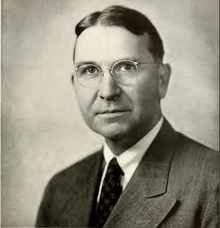John Edwin Pomfret
John Edwin Pomfret (September 21, 1898 – November 26, 1981)[2] was an American academic and administrator who served as the director of the Henry E. Huntington Library and Art Gallery and the twentieth president of the College of William & Mary.[3]
John Edwin Pomfret | |
|---|---|
 | |
| 20th President of the College of William & Mary | |
| In office 1942–1951 | |
| Preceded by | John Stewart Bryan |
| Succeeded by | Alvin Duke Chandler |
| Personal details | |
| Born | September 21, 1898 Philadelphia, Pennsylvania |
| Died | November 26, 1981 (aged 83) Camden, South Carolina |
| Spouse(s) | Sara Wise, m. August 28, 1926 |
| Children | John Dana |
| Parents | Edwin Pomfret Mary (O'Rorke) Pomfret |
| Education | University of Pennsylvania, A.B., M.A., Ph.D. |
| Alma mater | University of Pennsylvania |
| Known for | historian of Colonial America, especially New Jersey |
| Awards | -LL.D., University of Pennsylvania, 1943 -LL.D., University of Chattanooga (now University of Tennessee at Chattanooga), 1949 -LL.D., Mills College, 1958 -Litt.D., University of Southern California, 1966 -Litt.D., Claremont Graduate School and University Center, 1966 -Tailteann Award in nonfiction for The Struggle for Land in Ireland -Graphic Arts Award for one of fifty best books of the year, for California Gold Rush Voyages -State and Local History award for The Province of East New Jersey. |
| [1] | |
Early history
Pomfret was born in Philadelphia on September 21, 1898. He received his Bachelor and master's degrees at the University of Pennsylvania. His specialty was the history of Colonial America, particularly the Province of New Jersey.
From 1925 to 1934. Pomfret was an associate professor of history at Princeton University. In 1936, he was appointed as an assistant dean at Princeton.[4]
In 1937 Pomfret became the dean of Vanderbilt University's Senior College of Arts and Science and Graduate School
William and Mary
In 1941, Pomfret was appointed president of William and Mary. As president, he collaborated with Colonial Williamsburg in the founding of the Omohundro Institute of Early American History and Culture. In 1951, Pomfret resigned from William and Mary in the wake of a grade changing scandal involving the college's football team.[5] The college's board of visitors, censured Pomfret for the scandal, although he had no knowledge of it. Some board members wanted to force Pomfret out of office since his opposed expansion of the college football program
Huntington Library
In 1951, Pomfret became the director of the Huntington Library. Due to the scandal at William and Mary, he had offered to withdraw his acceptance of the Huntington. After an investigation, the Huntington Board told Pomfret that they still wanted him. He served as director until his retirement in 1966.
Pomfret died in Camden, South Carolina on November 26, 1981.
His papers from his time as president can be found at the Special Collections Research Center at the College of William and Mary.[6] A full account of his career and an assessment of his personality by Allan Nevins will be found in Pomfret's festschrift, The Reinterpretation of Early American History, edited by Ray Allen Billington (The Huntington Library, San Marino, CA, 1966).
Memberships
- Phi Beta Kappa (member of senate, 1943–55; vice-president, United Chapters, 1946–51)
- Pi Kappa Alpha
- American Antiquarian Society
- Massachusetts Historical Society
- Franklin Inn Club (Philadelphia)
- Sunset Club (Los Angeles)
- Twilight Club (Pasadena)
Writings
- Pomfret, John Edwin (1930). The Struggle for Land in Ireland. Princeton University Press.
- Pomfret, John Edwin (1935). The Geographic Pattern of Mankind. Appleton.
- Pomfret, John Edwin (1954). The Province of West New Jersey. Princeton University Press.
- Pomfret, John Edwin (1962). The Province of East New Jersey. Princeton University Press.
- Pomfret, John Edwin (1969). A History of the Huntington Library and Art Gallery. Henry E. Huntington.
- Pomfret, John Edwin (1970). Founding the American Colonies. Harper.
- Pomfret, John Edwin (1973). Colonial New Jersey, a History. Scribner.
- Pomfret, John Edwin, ed. (1954). California Gold Rush Voyages. Huntington Library.
- Pomfret, John Edwin, ed. (1954). Twelve Americans Speak. Huntington Library.
- Pomfret, John Edwin, ed. (1964). The New Jersey Proprietors and Their Lands. Van Nostrand.
References
- "John Edwin Pomfret". Contemporary Authors Online (Fee, via Fairfax County Public Library)
|format=requires|url=(help). Detroit: Gale. 2003. Gale Document Number: GALE|H1000079025. Retrieved 2011-09-06. Gale Biography In Context. - White, James Terry, ed. (1960). The National Cyclopaedia of American biography, Volume 1. Retrieved 2011-09-06.
- "Pomfret, John Edwin". Special Collections Research Center, Earl Gregg Swem Library, College of William & Mary. Retrieved 26 January 2011.
- "DR. JOHN POMFRET, PRESIDENT OF WILLIAM AND MARY IN 40'S". The New York Times. 1981-11-27. ISSN 0362-4331. Retrieved 2017-10-19.
- "Pomfret, John Edwin". Special Collections Research Center, Earl Gregg Swem Library, College of William & Mary. Retrieved 26 January 2011.
- "Office of the President. John Edwin Pomfret". Special Collections Research Center, Earl Gregg Swem Library, College of William and Mary. Retrieved 26 January 2011.